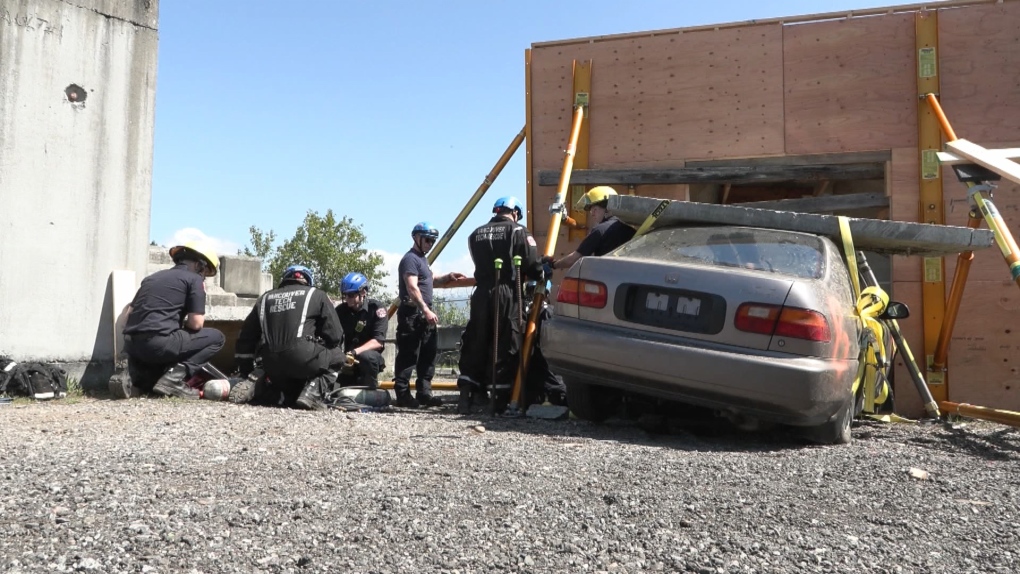Vancouver's heavy urban search and rescue team constantly training for worst-case scenario
 In one scenario at Wednesday’s training session, two patients were trapped under a car that had been driven into a building. (CTV)
In one scenario at Wednesday’s training session, two patients were trapped under a car that had been driven into a building. (CTV)
People living on the South Coast are frequently reminded to be prepared for a major earthquake – and when the big one does hit, members of the heavy urban search and rescue team will be among the first to respond.
Vancouver Fire Rescue Services invited CTV News to the team’s weekly training exercise to see how members stay ready for the unexpected.
Known as Canada Task Force One, the team is comprised of firefighters, police, paramedics, engineers and emergency room doctors.
“We bring all those people together and we build a 150-person team that has that diverse skillset and experience to respond to some very unique and challenging scenarios,” said team member and firefighter Capt. Eric Grootendorst.
In one scenario at Wednesday’s training session, two patients were trapped under a car that had been driven into a building.
A second exercise underway at the same time had team members searching the rubble of a collapsed building for injured survivors.
In the event of a major earthquake or other disaster, that is the type of work the team, and other emergency responders, will be focused on.
That’s why people are asked to be prepared to get by on their own for at least 72 hours when a major earthquake hits.
“We’re reminding people really how to stay resilient in the event of a disaster,” said VFRS Capt. Mathew Trudeau. “And part of Emergency Preparedness Week is the five key fundamental steps to be prepared in the event of a major emergency or disaster.”
Those emergency fundamentals are:
- Know your hazards
- Make a plan to stay safe
- Have 72 hours of supplies
- Stay informed
- Connect with nearby community members
In the event of an earthquake, it is tall, older buildings that are likely to be the most unstable – but widespread fires throughout the city could also be a risk if gas lines rupture.
Trudeau says VFRS has dedicated infrastructure built to withstand large earthquakes to make sure firefighters can still douse the flames even if city water mains crumble under the shaking.
“We have a dedicated fire protection system within the City of Vancouver which dedicates its own two pumping stations, a reservoir of water, and it has a piping network able to withstand an 8.6 magnitude (quake),” Trudeau said.
In addition to training for worst-case scenarios that may happen in Metro Vancouver, Canada Task Force One is also able to deploy quickly to offer assistance when disasters happen elsewhere.
"Whether that’s somewhere else in the province, somewhere else in Canada or internationally, we learn valuable skills and we bring that back so that we can support the City of Vancouver and the province of British Columbia,” said Trudeau.
CTVNews.ca Top Stories

Doctors say capital gains tax changes will jeopardize their retirement. Is that true?
The Canadian Medical Association asserts the Liberals' proposed changes to capital gains taxation will put doctors' retirement savings in jeopardy, but some financial experts insist incorporated professionals are not as doomed as they say they are.
Something in the water? Canadian family latest to spot elusive 'Loch Ness Monster'
For centuries, people have wondered what, if anything, might be lurking beneath the surface of Loch Ness in Scotland. When Canadian couple Parry Malm and Shannon Wiseman visited the Scottish highlands earlier this month with their two children, they didn’t expect to become part of the mystery.
Fair in Ontario, flurries in Labrador: Weather systems make for an erratic spring
It's no secret that spring can be a tumultuous time for Canadian weather, and as an unseasonably mild El Nino winter gives way to summer, there's bound to be a few swings in temperature that seem out of the ordinary. From Ontario to the Atlantic, though, this week is about to feel a little erratic.
What a urologist wants you to know about male infertility
When opposite sex couples are trying and failing to get pregnant, the attention often focuses on the woman. That’s not always the case.
He replaced Mickey Mantle. Now baseball's oldest living major leaguer is turning 100
The oldest living former major leaguer, Art Schallock turns 100 on Thursday and is being celebrated in the Bay Area and beyond as the milestone approaches.
'It was instant karma': Viral video captures failed theft attempt in Nanaimo, B.C.
Mounties in Nanaimo, B.C., say two late-night revellers are lucky their allegedly drunken antics weren't reported to police after security cameras captured the men trying to steal a heavy sign from a downtown business.
Bank of Canada officials split on when to start cutting interest rates
Members of the Bank of Canada's governing council were split on how long the central bank should wait before it starts cutting interest rates when they met earlier this month.
Quebec nurse had to clean up after husband's death in Montreal hospital
On a night she should have been mourning, a nurse from Quebec's Laurentians region says she was forced to clean up her husband after he died at a hospital in Montreal.
Northern Ont. lawyer who abandoned clients in child protection cases disbarred
A North Bay, Ont., lawyer who abandoned 15 clients – many of them child protection cases – has lost his licence to practise law.































